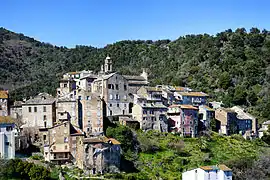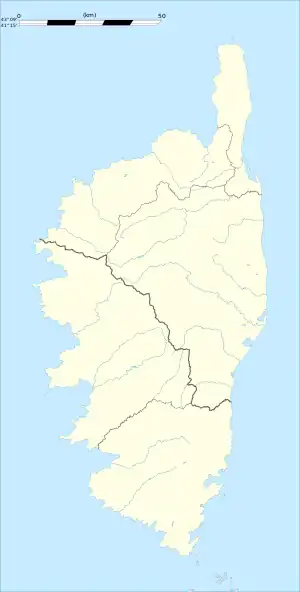Vescovato, Haute-Corse
Vescovato (French pronunciation: [vɛskɔvato]; Corsican: U Viscuvatu) is a commune in the Haute-Corse department of France on the island of Corsica.
Vescovato
U Vescuvatu | |
|---|---|
 A view of the village of Vescovato | |
 Coat of arms | |
Location of Vescovato | |
 Vescovato  Vescovato | |
| Coordinates: 42°29′41″N 9°26′26″E | |
| Country | France |
| Region | Corsica |
| Department | Haute-Corse |
| Arrondissement | Corte |
| Canton | Casinca-Fumalto |
| Government | |
| • Mayor (2020–2026) | Benoît Bruzi[1] |
| Area 1 | 17.52 km2 (6.76 sq mi) |
| Population | 3,032 |
| • Density | 170/km2 (450/sq mi) |
| Time zone | UTC+01:00 (CET) |
| • Summer (DST) | UTC+02:00 (CEST) |
| INSEE/Postal code | 2B346 /20215 |
| Elevation | 0–440 m (0–1,444 ft) (avg. 140 m or 460 ft) |
| 1 French Land Register data, which excludes lakes, ponds, glaciers > 1 km2 (0.386 sq mi or 247 acres) and river estuaries. | |
Its name derives from the Italian term for "bishopric". (Italian: vescovado) According to Lucien Auguste Letteron (a Corsican Historian), the name would originate from the Bishop of Mariana, Opizzu Cortincu (1218-1260 ?) who founded the new village.
Population
| Year | Pop. | ±% p.a. |
|---|---|---|
| 1968 | 1,509 | — |
| 1975 | 2,040 | +4.40% |
| 1982 | 2,129 | +0.61% |
| 1990 | 2,329 | +1.13% |
| 1999 | 2,316 | −0.06% |
| 2007 | 2,295 | −0.11% |
| 2012 | 2,557 | +2.19% |
| 2017 | 2,836 | +2.09% |
| Source: INSEE[3] | ||
Personalities
- French footballer Charles Orlanducci, born in Vescovato in 1951.
- French industrialist and entrepreneur Michel Pierucci, born in Vescovato in 1966. Involved in the political stage, where he was Director of the Businenss Chamber of Northern Corsica, and the opposition to the mayor. He is a non-affiliated right-winged politician.[4]
- Joachim Murat, former Maréchal of France and once King of Naples, briefly hid out in Vescovato in August 1815 after Napoleon's ultimate defeat at Waterloo, before marching on Ajaccio.
- Joachin Pierucci, former industrialist, turned philanthropist. He was part of the France national team of Pétanque{?}, from whom he received the Bronze Médaille des Sports and ran La Boule Dorée.[5]
References
- "Répertoire national des élus: les maires". data.gouv.fr, Plateforme ouverte des données publiques françaises (in French). 2 December 2020.
- "Populations légales 2020". The National Institute of Statistics and Economic Studies. 29 December 2022.
- Population en historique depuis 1968, INSEE
- "Les élections des chambres de métiers devant la justice". 7 January 2011.
- "Pétanque : Nouveau record pour Christophe Jumel en Corse - Corse - ARTICLES sur la pétanque".
External links
- Official website (in French)
Wikimedia Commons has media related to Vescovato (Haute-Corse).
This article is issued from Wikipedia. The text is licensed under Creative Commons - Attribution - Sharealike. Additional terms may apply for the media files.